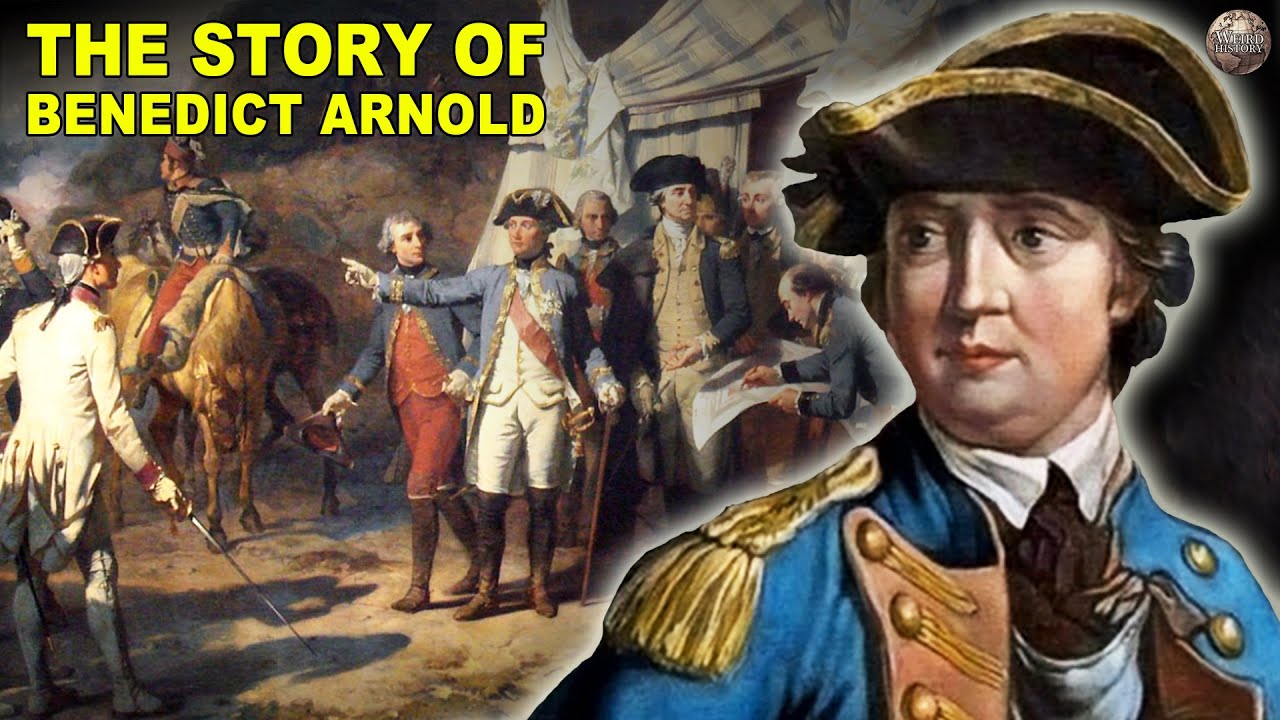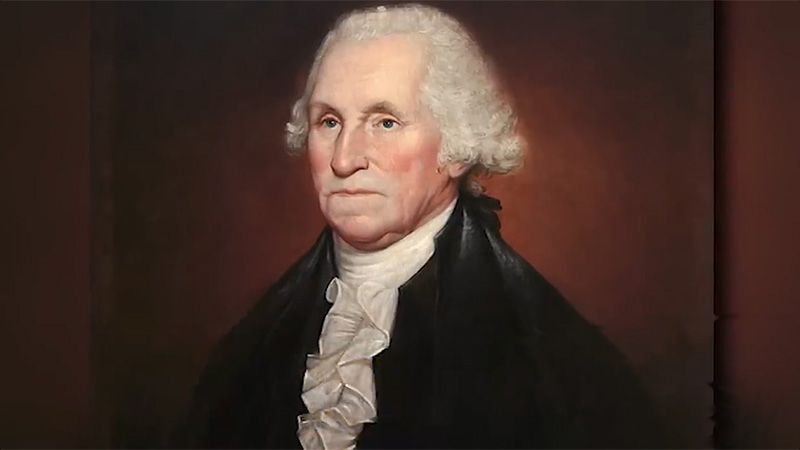
“… I have suffered, in seeing the fair fabric of reputation… undermined by those, whose posterity (as well as themselves) will feel the blessed effects of my efforts.”
–Benedict Arnold, January, 1780
BENEDICT ARNOLD REMAINS the most notorious man in American history, his name a synonym for traitor.
“Since the fall of Lucifer,” General Nathanial Greene judged, “nothing has equaled the fall of Arnold.”
Yet Arnold’s accomplishments for the patriot cause were extraordinary. Without his brilliant military exploits, America might never have won its independence. He led his men on a harrowing trek through the Maine wilderness to Canada, kept a British fleet from conquering Albany in 1776, saved Fort Stanwix and commanded the victorious charge at Saratoga in 1777, an attack in which he was grievously wounded. Dishonored by Congress and beset by political foes, he turned to the enemy. When his plan to surrender West Point was discovered he fled to British-occupied New York City and, after the war, sailed into exile never to return.
Here are 10 things you might not know about Benedict Arnold.
Was Arnold the finest officer of the War of Independence? (Image source: WikiCommons)
Arnold was the best officer on either side
Although having no military experience before the Revolutionary War, Arnold has been judged the best officer on either side. In his classic work on the British army, J.W. Fortescue wrote:
“In natural military genius neither Washington nor Greene are to my mind comparable with Benedict Arnold. He possessed all the gifts of a great commander. To boundless energy and enterprise, he united quick insight into a situation, sound strategic instinct, audacity of movement, wealth of resource, a swift and unerring eye in action, great personal daring, and true magic of leadership. He was brave, daring, had great strategic insight and that rare magic of leadership that made men follow him.”
When debts threatened to ruin his family, Arnold dropped out of school and started a business.
Later, he prospered a merchant sailor. (Image source: WikiCommons)
He was forced to quit prep school and bail his family out of debt
Although Arnold was destined to go to Yale, when his father became an alcoholic and his business collapsed Arnold was pulled from prep school and apprenticed to apothecaries. He worked hard, learned, started his own business in New Haven, Connecticut, repaid his family’s debts, and became a successful merchant seaman sailing his ships north to Canada, south to the Caribbean and across the Atlantic to Great Britain.
Arnold led Continental troops in an invasion of Canada during the first winter of the Revolution.(Image source: WikiCommons)
He commanded the Continental’s siege of Quebec
After Richard Montgomery, Washington’s commander of the 1775 assault on Quebec, was killed, it fell to Arnold, the ranking officer, seriously wounded himself, to take charge of the rigorous winter siege. Congress refused his request to appoint a paymaster for its army at Quebec, but nevertheless Arnold was later charged with misusing funds spent for his force in Canada and for his arduous trek with his men through the wilderness of Maine.
When army paymasters were unable to provide for the men under Arnold’s command, the future turn-coat provided money for the troops from of his own pocket. Far from being thankful for the gesture, Congress later audited Arnold. (Image source: WikiCommons)
He used his own money to pay his men
When Congress failed to pay Arnold’s troops, he paid them from his own pocket, despite the fact that his shipping business was hard hit by the British blockade. Congress failed to pay him as well, but expected him to keep exact records of any funds it advanced. Later it would charge that he owed the United States £1,000.
Arnold constructed a fresh water fleet on Lake Champlain to prevent the British from gaining control of the vital inland waterway. (Image source: WikiCommons)
He built a freshwater navy to oppose the British
To counter a powerful British fleet preparing to sail down Lake Champlain, Arnold was charged with building a fleet of ships in three months to combat them. With extraordinary skill and energy, he supervised the construction and manning of a small flotilla, then led his tiny navy onto the lake to await the British. They met in a fierce battle which, and although not failing to win the day, the Americans persuaded the British to retreat to Canada protecting New York for another year.
Arnold had a horse shot out from under him at the battle of Saratoga. (Image source: WikiCommons)
He led a victorious charge at Saratoga while holding no official command
Although his jealous commander, General Horatio Gates, confined Arnold to his tent during the battle of Saratoga, the future turncoat galloped onto the field to the cheers of the men. Though without official command, he led them in a victorious assault on British lines. Arnold’s horse was shot and his leg shattered during the charge. Despite remaining in his own tent for much of the day, General Gates took credit for the victory.
Peggy Arnold. (Image source: WikiCommons)
Peggy Arnold knew nothing of his plot
Numerous recent books and television movies accuse Arnold’s lovely wife, Peggy Shippen, of instigating his treason or being complicit in it. However, she was, as George Washington, Alexander Hamilton, Lafayette and others who knew her believed, innocent, and shocked at his betrayal. Nevertheless, after his treason was discovered and she returned to her family in Philadelphia, the cautious Pennsylvania government forced her to leave and go into exile with her husband.
Arnold donned the crimson tunic of a British officer and led redcoats against his home state. (Image source: MilitaryHistoryNow.com)
Arnold led British troops in battle
After his defection, Arnold led British troops against Washington’s army in Virginia, chasing Thomas Jefferson, governor of the state, from his home. In a second campaign, this time against his home state of Connecticut, Arnold’s soldiers seized a fort but left New London in flames.”

“……我痛苦地看到美好的名声……被那些将来(以及他们自己)将感受到我努力所带来的福祉的人所削弱。” ——本杰明·阿诺德,1780年1月
本杰明·阿诺德仍然是美国历史上最臭名昭著的人物,他的名字成为了“叛徒”的同义词。
“自路西法堕落以来,”将军纳撒尼尔·格林评价道,“没有什么能与阿诺德的堕落相提并论。”
然而,阿诺德为爱国事业所做的成就非凡。如果没有他卓越的军事功绩,美国可能永远无法赢得独立。他带领士兵们穿越缅因州的荒野,艰难跋涉至加拿大,阻止了一支英国舰队在1776年征服奥尔巴尼,拯救了斯坦威克堡,并在1777年指挥了萨拉托加的胜利冲锋,在这次攻击中他严重受伤。由于受到国会的羞辱和政治敌人的围攻,他转向了敌人。当他企图投降西点时被发现后,他逃到了英国占领的纽约市,战后流亡海外,再也没有回国。
以下是你可能不知道的关于本杰明·阿诺德的10件事。
1、阿诺德是独立战争中最优秀的军官吗? 尽管在独立战争之前没有军事经验,阿诺德被评为双方中最优秀的军官。在他关于英国军队的经典著作中,J.W. 福特斯丘写道:
2、“在天生的军事才能方面,我认为华盛顿和格林都无法与本杰明·阿诺德相提并论。他具备了伟大指挥官的所有天赋。除了无尽的精力和冒险精神,他还具备对局势的敏锐洞察、出色的战略直觉、果敢的行动、丰富的资源、迅速而准确的判断、巨大的个人勇气和真正的领导魅力。他勇敢、果断,具有出色的战略洞察力,以及让人们愿意追随他的罕见领导魔力。”
3、当债务威胁到他的家庭时,阿诺德辍学并开始创业。 后来,他作为商船水手获得了成功。 他被迫辍学以解救家人的债务 尽管阿诺德原本注定要去耶鲁大学,但当他的父亲酗酒、家庭生意倒闭时,阿诺德被迫辍学并在药剂师那里做学徒。他努力工作,学习,最终在康涅狄格州纽黑文开了自己的生意,偿还了家里的债务,成为了一名成功的商船水手,航行到加拿大、加勒比海和大西洋的英国。
4、阿诺德在革命的第一个冬天指挥大陆军对加拿大的入侵。 他指挥大陆军围攻魁北克 在华盛顿的指挥官理查德·蒙哥马利在1775年攻打魁北克时被杀后,阿诺德作为排名最高的军官,尽管自己也重伤,接手了艰苦的冬季围攻。国会拒绝了他为魁北克军队任命一名财务官的请求,但阿诺德后来被指控挪用在加拿大为他的部队所花费的资金,以及与士兵们艰苦穿越缅因州荒野的费用。
5、当军队的财务官无法为阿诺德指挥的部队提供资金时,这位未来的叛徒自掏腰包为士兵们支付工资。国会对此并未表示感谢,反而对阿诺德进行了审计。
6、他自掏腰包为士兵支付薪水 当国会未能支付阿诺德的部队时,他从自己的口袋里支付了士兵的工资,尽管他的航运业务受到英国封锁的严重影响。国会也没有支付他,但却要求他准确记录任何预付款。后来,他们指控他欠美国£1,000。
7、阿诺德在香农湖建造了一支淡水舰队,以防止英国控制这条重要的内陆水道。 他建立了淡水海军来对抗英国人 为了对抗准备沿香农湖下航的强大英国舰队,阿诺德被指派在三个月内建造一支舰队来与之作斗争。他以非凡的技能和精力监督小舰队的建设和装备,随后带领他的舰队驶入湖中,等待英国人。他们在湖面上展开了一场激烈的战斗,虽然没有赢得胜利,但美国人成功地迫使英国人撤退到加拿大,为纽约再保留了一年。
8、阿诺德在萨拉托加战役中骑马被击落。 他在没有正式指挥的情况下指挥萨拉托加的胜利冲锋 尽管他的嫉妒的指挥官霍雷肖·盖茨将阿诺德限制在帐篷内,但这位未来的叛徒仍然冲入战场,赢得了士兵们的欢呼。尽管没有正式的指挥,他还是领导他们对英国军队发起了胜利的攻击。阿诺德的马在冲锋时被击中,他的腿也被摔断。尽管当天大部分时间待在自己的帐篷里,盖茨将军却声称自己赢得了胜利。
9、佩吉·阿诺德。 佩吉·阿诺德对他的阴谋一无所知 许多最近的书籍和电视电影指责阿诺德的美丽妻子佩吉·希彭参与他的叛国行为或对此默许。然而,正如乔治·华盛顿、亚历山大·汉密尔顿、拉法耶特和其他了解她的人所相信的那样,她是无辜的,并对他的背叛感到震惊。然而,在她的叛国行为被发现后,她回到费城的家人身边,宾夕法尼亚州政府出于谨慎,迫使她离开,与丈夫一起流亡。
10、阿诺德穿上英国军官的红色外套,带领红衣军队对抗自己的家乡。 阿诺德在战斗中指挥英国军队 叛变后,阿诺德指挥英国军队在弗吉尼亚对抗华盛顿的军队,驱逐了州长托马斯·杰斐逊。在第二次行动中,这次是针对他自己的家乡康涅狄格州,阿诺德的士兵夺取了一座堡垒,但却让新伦敦陷入火海。



